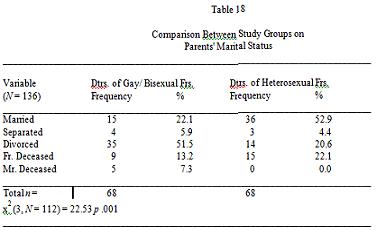Recently, a lively discussion has been taking place on the thread of this post: Seton Hall professor: NARTH member “misreported and misrepresented” my research (go to the comments section for the discussion). Central to the discussion has been disputes about whether or not a study by Theodora Sirota on women who grew up in mixed orientation marriages could offer any insight about gay parenting in general. Sirota found that women with gay fathers and a straight mother had more problems with interpersonal trust.
I wrote the post after Dr. Sirota made a statement about how her study was misused in an article by National Association for the Research and Therapy of Homosexuality member, Rick Fitzgibbons, posted on the website Mercatornet. Fitzgibbons generalized the results of Sirota’s work to gay couples saying,
There are strong indications that children raised by same sex couples fare less well than children raised in stable homes with a mother and a father.
Fitzgibbons then cited Sirota’s study as evidence for this claim even though the adult women in Sirota’s study grew up in homes where both a mother and father lived, at least for a time. The issue for Fitzgibbons was the father was gay.
Fitzgibbons’ writing partner on the topic of forgiveness, Robert Enright (professor at University of Wisconsin-Madison), then joined the conversation, and after much discussion boiled down his belief about what Fitzgibbons sought to accomplish with his use of the Sirota study.
There is *indirect* (not direct) evidence in the peer-reviewed scientific literature showing statistically significant (in the case of Sarantakos and Sirota) negative effects for children when at least one LGB parent is studied scientifically.
Sarantakos studied gay couples (I will eventually present a critique of this study) but Sirota is the study which Enright referred to as having one gay parent.
There are many things wrong with the way Fitzgibbons used the Sirota study but here I want to note one not often covered. Essentially, Fitzgibbons proposes that same-sex attracted parents are harmful to children, even if they follow church teaching and marry heterosexually.
Many men I work with clinically are gay or bisexual but have fallen in love with their female spouse and together they have made a marriage work. By Fitzgibbons’ reasoning, the children involved are at greater risk for being hurt simply because one parent is gay/bisexual, even though they grow up in a home with a mother and father.
Fitzgibbons’ article, whether intended or not, stigmatizes people with same-sex attraction, no matter how they live.
In fact, Sirota’s research did not use representative sampling and almost nothing can be generalized from it to other mixed orientation couples. The mixed orientation parents in her study divorced more frequently and so it is highly likely that the results were more related to divorce than to anything else. However, in any case, Sirota’s results are only suggestive of further studies and prove nothing. Fitzgibbons’ use of the study was unwarranted and as a result recklessly stigmatized both gay couples as well as those men who direct their lives in accord with their religious views.
